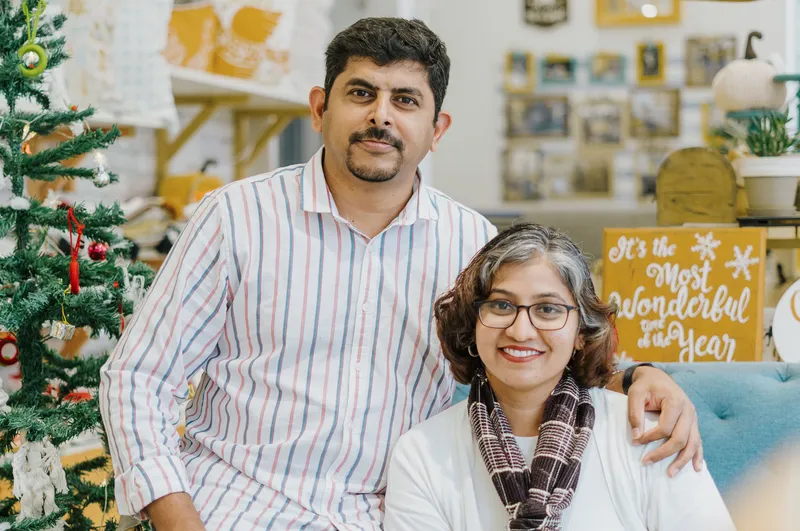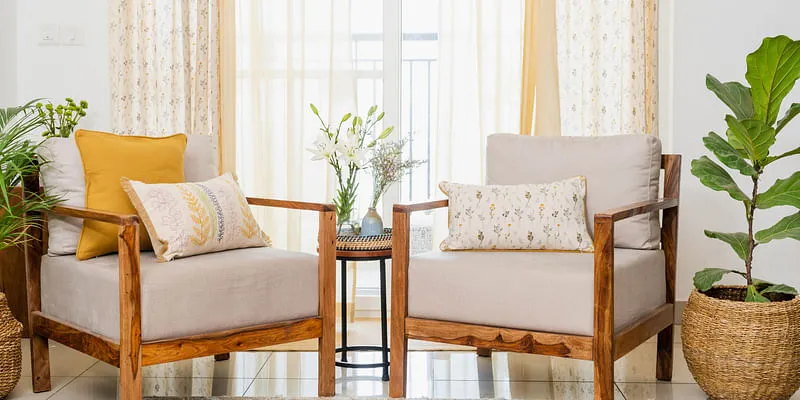This home furnishings brand promises vibrant aesthetics through sustainable yet affordable products
Bengaluru-based The Yellow Dwelling makes bright and vibrant home furnishings from sustainable materials and ethical procedures, while ensuring the price stays affordable.
Since most of our time is spent in the confines of our dwellings, appealing aesthetics and creature comforts are necessary to our wellbeing. Aware of this simple truth, Bengaluru-based home furnishings brand launched its line of pleasing-to-the-eye home décor in 2017.
Started by Abhinayah Sundaramoorthy and Nandakumar Lakshmanan, The Yellow Dwelling now operates across three states in India – a centralised warehouse in Tamil Nadu, a franchise store in Hyderabad, and two retail stores and an experience centre in Bengaluru.
“In 2017, when we were decorating our home, we scouted the market for furnishings which exuded light, colourful, and cheerful prints. With no luck, it soon became glaringly obvious to us that the home furnishing market lacked such designs at an affordable price point. Our learning from this experience motivated us to create a brand which stood for creativity in design along with being sustainable,” explain the founders as they join YSWeekender for a chat about the business.
A sustainable vision
Abhinayah has an MBA from Bharathidasan Institute of Management in Trichy. She has twelve years of experience in Finance and Strategy with companies like ITC Limited, ITC Infotech, and Vidyo Inc., USA.
Nandakumar completed his Post Graduate Diploma in Business Management from XLRI, Jamshedpur. He has sixteen years of experience in Sales and Distribution with companies like ITC Limited, Pepsi Co., and Tupperware.
“The Yellow Dwelling’s journey started in January 2017 from a small guest bedroom in Bengaluru. The brand was created because we wanted to bring sustainable furnishing at an affordable price point to the Indian market. Unfortunately, the term ‘sustainability’, while vital, is sometimes construed as being accessible only to the affluent. The Yellow Dwelling was meant to bridge this gap. We also have contemporary designs in our repertoire which we believe are different from other home furnishings available in the market currently,” shares Abhinayah.
She hopes the brand will become the preferred national home furnishing brand because of its unique contemporary design philosophy using a wide range of sustainable natural fibres.

Nandakumar Lakshmanan and Abhinayah Sundaramoorthy
Their products are retailed both online and offline and are available throughout India and abroad. They are available on their website, theyellowdwelling.com, and on Amazon, Myntra, and PepperFry. Their brick-and-mortar stores are located in Hennur and HSR in Bengaluru and in Gachibowli in Hyderabad.
“The Yellow Dwelling’s name is an answer to the realisation that the Indian market lacked refreshing, vibrant, and cheerful designs when it came to home furnishings. We want Indian homes to be happy and cheerful. As per colour psychology, yellow promotes happiness, optimism, and warmth, which we felt made it the perfect name for the brand,” shares Nandakumar.
The product line-up
“Our product range is grouped under the categories of living, dining, bedding, and home décor. Under this we have curtains, cushions, table linen, placemats, flat sheets, fitted sheets, quilts, throws and an array of home décor products ranging from woven grass, macrame, to wooden curios and ceramics,” explains Abhinaya.
She goes on to highlight that their products are made from natural materials that are responsibly sourced. The cotton they use is Better Cotton Initiative (BCI) certified, and they strive to follow sustainable practices from raw material sourcing to stitching and packaging.
“At The Yellow Dwelling, functionality meets aesthetics so all the colours we use for printing and dyeing meet the highest safety standards (OEKO-TEX). There are no harmful chemicals used making our products safe to the skin for not only our craftsmen who make the products but the customers who use them too. Our products are also completely made in India,” asserts Nandakumar.
Their in-house design team is responsible for the aesthetic, sustainable, and utilitarian products they produce. With the brand ethos in mind, the design team researches trend forecasts, listens to customer feedback, and curates collections three times a year.
Curtains are their most popular products, and they offer a range of customisable curtains because every home is unique. Customers can pick from prints and solid colours and have the length tailored to their specifications. This includes a choice of six different header styles like eyelet, pleated, channel, pocket rod, button tab, and back tab. Various lining solutions are also available based on the amount of light one is looking for in their space.
Their products range in price from Rs 225 for a 12*12 cushion cover to Rs 5,580 for their double quilts.
Challenges and growth
As Abhinayah points out, “Every entrepreneur and startup faces challenges. Our challenges were directly proportionate to the size of our business. For instance, in the beginning, we faced the challenge of quitting our steady 9-5 jobs and transitioning into building a brand from scratch. As we overcame that hurdle, we were faced with the tedious task of finding a manufacturer that met our expectations and was willing to take on a small quantity order. We scouted far and wide and soon forged strategic partnerships with some of the world’s best manufacturing units. We are defined not only by the challenges we face but how we overcome them. Our dream for The Yellow Dwelling was much larger than the challenges we faced. It was this realisation that fuelled our drive and has led us to where we are today.”
According to a recent report by Bengaluru-based market research firm ResSeer, India’s online furniture and home market is geared to reach $40 billion by 2026, ensuring that players like The Yellow Dwelling will continue to grow.
Their initial investment was Rs 12,500 for a curated collection showcased to friends and family. As the business grew over the next few years, the team invested about Rs 50 lakh in stores, warehouse setup, and stocks, and have seen steady growth since then.
In 2020, their turnover grew by 425 percent, in 2021 it grew by 276 percent, and in 2022 by 165 percent.

The team aims to open 20 more stores in India by 2025 and plans to foray into major international markets as well.
When asked about direct competitors, Abhinayah names brands like Freedomtree and Good Earth, but is quite quick to point out that they are not really in the same category, as The Yellow Dwelling has a unique aesthetic, is focused on sustainability, and is more reasonably priced. However, she adds that these brands push them to innovate on the products they offer to their customers.
“We pride ourselves on creating a responsible brand that has been transparent about its process and usage of responsibly sourced materials. The brand continues to fulfil its initial dream of being a sustainable and affordable brand, which produces contemporary designs. Another major achievement has been to generate local employment in the turbulent times of the pandemic,” Nandakumar shares, further adding,
“As a sustainable brand that encourages the use of natural fibres in your homes, we have expanded beyond cotton and using linen, bamboo, jute, banana fibre and river grass in our home furnishing products. As a brand we are constantly looking for ways to make homes more beautiful with sustainable products.”
“We are couple-preneurs bringing different skill sets to the table. We often hear about one spouse venturing into business with the safety net of the other spouse working in corporate. But we both decided to pursue the business because of the conviction and confidence we had in our brand and its potential,” he adds.
It seems this conviction is paying off.
Edited by Megha Reddy








